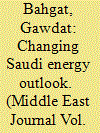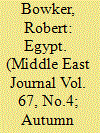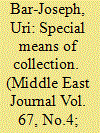| Srl | Item |
| 1 |
ID:
124751


|
|
|
|
|
| Publication |
2013.
|
| Summary/Abstract |
For a long time the conventional wisdom in Middle Eastern Studies has been that oil and regional security constituted the basis of relations between the United States and Saudi Arabia. Riyadh would ensure adequate supplies at reasonable prices, and in return, Washington would guarantee the Kingdom's security against regional threats. In recent years, the two nations' energy landscapes have changed dramatically. The United States is projected to become less dependent on foreign energy sources, while Saudi Arabia has allocated substantial resources to diversify its energy mix, utilize alternative energy, and reduce consumption. This article examines the recent Saudi efforts to develop nuclear power and renewable resources; and also provides a preliminary assessment of potential strategic implications of these efforts for US-Saudi relations.
|
|
|
|
|
|
|
|
|
|
|
|
|
|
|
|
| 2 |
ID:
124752


|
|
|
|
|
| Publication |
2013.
|
| Summary/Abstract |
Pressure for change at all levels - individual, family, and state - preceded the 2011 Arab uprisings. It will continue, driven by inexorable factors including demography, education, Internet-based connectivity among like-minded groups, wage-based employment of women, and changing business models. The following analysis of the Egyptian case provides a background for understanding Egypt's challenges in the wake of President Mohamed Morsi's July 2013 ousting and the military's takeover.
|
|
|
|
|
|
|
|
|
|
|
|
|
|
|
|
| 3 |
ID:
124748


|
|
|
|
|
| Publication |
2013.
|
| Summary/Abstract |
Israeli narratives of the 1973 Arab-Israeli War highlight the army's lack of preparedness in the wake of a successful surprise attack by Egypt and Syria on the Jewish holiday of Yom Kippur, despite assumptions of Israel's intelligence gathering capabilities. Using recently declassified government documents, this article reveals a communication breakdown among Israel's leadership over the operational status of a top secret means of surveillance. This intelligence failure provides the missing link between Israel's wealth of information and the decision to avoid mobilizing the country's reserve army until it was too late.
|
|
|
|
|
|
|
|
|
|
|
|
|
|
|
|
| 4 |
ID:
124750


|
|
|
|
|
| Publication |
2013.
|
| Summary/Abstract |
On the surface, the 2011 Tunisian Revolution seems attributable primarily to economic causes, social media, and the army's refusal to back the regime of President Zine El-'Abidine Ben 'Ali. A deeper look reveals that its success depended on the interaction between the structural brittleness of a regime that had alienated many key civilian constituencies and the emergence of sustained, cross-class, geographically widespread, mass demonstrations. These demonstrations were facilitated by Islamist moderation, secularist-Islamist rapprochement within the opposition, and the actions of the Tunisian General Union of Labor (Union Générale Tunisienne du Travail, or UGTT). In the wake of Ben 'Ali's departure, Islamist moderation and the fruits of secularist-Islamist rapprochement facilitated the holding of elections and the drafting of a new constitution.
|
|
|
|
|
|
|
|
|
|
|
|
|
|
|
|
| 5 |
ID:
124747


|
|
|
|
|
| Publication |
2013.
|
| Summary/Abstract |
This article discusses postretirement appointments and financial rewards the Egyptian military elite secured under former Egyptian president Husni Mubarak. It draws on two original databases: the first analyzes the professional background of the 156 Egyptian governors appointed by Mubarak, and studies the evolution of the military elite's share of governorship positions throughout his years in power. The second database includes details on postretirement careers of Egypt's top 65 officers who led the main corps of the armed forces under Mubarak. It analyzes mechanisms used by Mubarak's predecessors to secure the loyalty of the military elite, and shows that increasing the privileges of the top brass remained a stable feature of control systems that were otherwise fundamentally different. It discusses how Mubarak wedded senior officers to his regime throughout his three decades in power by enhancing their material privileges and allowing them to profit from their postretirement positions, unhindered by monitoring agencies.
|
|
|
|
|
|
|
|
|
|
|
|
|
|
|
|